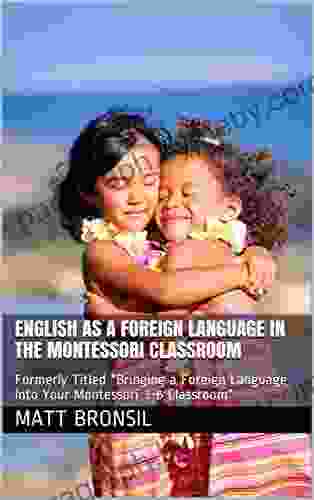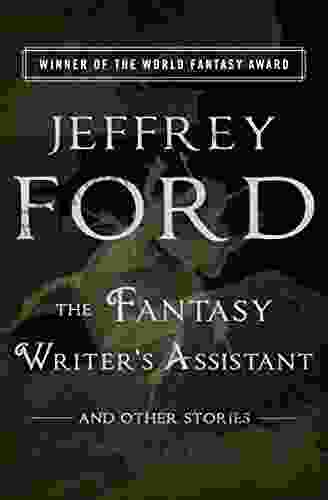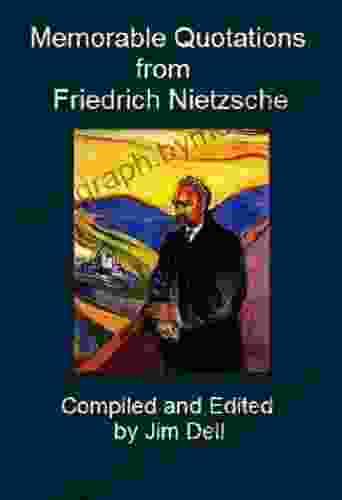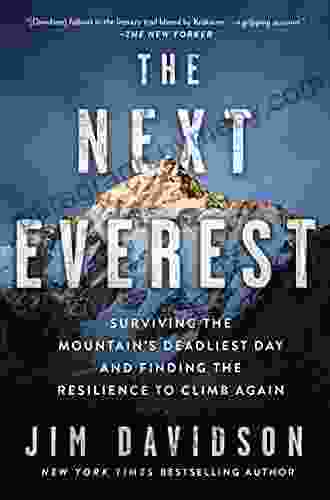Unlocking the Power of English as a Foreign Language in the Montessori Classroom


5 out of 5
| Language | : | English |
| File size | : | 2012 KB |
| Text-to-Speech | : | Enabled |
| Screen Reader | : | Supported |
| Enhanced typesetting | : | Enabled |
| Word Wise | : | Enabled |
| Print length | : | 172 pages |
| Lending | : | Enabled |
In a world where global communication is paramount, providing young learners with the opportunity to master English as a foreign language (EFL) is of utmost importance. The Montessori method, renowned for its child-centered and experiential approach to education, offers a unique and compelling framework for teaching EFL that fosters a deep love for language and a lifelong passion for learning.
This comprehensive article will delve into the principles, methods, and benefits of teaching EFL in the Montessori classroom. We will explore how this innovative approach empowers young learners to:
- Develop a strong foundation in English language skills
- Embrace the English language with confidence and enthusiasm
- Engage in meaningful language-based activities that nurture cognitive growth
- Become effective communicators and global citizens
Principles of EFL in the Montessori Classroom
The Montessori approach to EFL teaching is anchored in several fundamental principles:
- Respect for the Child: The child is seen as a capable and curious individual with an innate ability to learn. The teacher's role is to provide a supportive environment that fosters the child's natural language acquisition process.
- Cognitive Development: EFL activities are designed to stimulate cognitive development and refine language skills. Children actively engage with language through hands-on experiences, manipulatives, and real-life scenarios.
- Immersion: The classroom environment is infused with English language. Children are exposed to the language through songs, stories, games, and everyday interactions, creating a natural and immersive learning experience.
- Individualized Learning: The teacher observes each child's progress and tailors instruction to their unique needs and learning styles. Children are encouraged to learn at their own pace and explore interests that ignite their passions.
Methods and Activities for EFL in the Montessori Classroom
The Montessori classroom offers a rich array of materials and activities designed to engage children in EFL learning. These include:
- Phonics: Children learn the sounds of English letters and blend them to form words. They use sandpaper letters, letter-tracing trays, and sound games to develop phonemic awareness and build a solid foundation for reading.
- Vocabulary: The environment is filled with labeled objects, flashcards, and picture stories to expand children's vocabulary. They are encouraged to explore meanings, make connections, and develop a deep understanding of words.
- Grammar: Grammar is presented in a practical and meaningful way. Children engage in activities that demonstrate the use of grammar rules, such as sorting words into categories, constructing sentences, and playing grammar games.
- Reading and Writing: Children are introduced to the written word through authentic texts, storybooks, and writing exercises. They learn to decode words, write letters and sentences, and express themselves creatively through writing.
- Listening and Speaking: The classroom provides ample opportunities for children to practice listening and speaking skills. They participate in conversations, story-telling, role-playing, and group discussions to improve pronunciation, fluency, and comprehension.
Benefits of EFL in the Montessori Classroom
The Montessori approach to EFL teaching offers numerous benefits for young learners:
- Enhanced Language Proficiency: Children develop a strong foundation in all aspects of language, including speaking, listening, reading, and writing. They become confident and fluent in using English for communication and self-expression.
- Cognitive Growth: The hands-on, experiential nature of EFL activities stimulates cognitive development. Children improve their memory, problem-solving skills, and ability to think critically and creatively.
- Cultural Awareness: EFL learning in the Montessori classroom also fosters cultural awareness. Children learn about English-speaking cultures, traditions, and perspectives, promoting understanding and appreciation of diversity.
- Global Citizenship: By mastering English, children become global citizens who can communicate effectively with people from all over the world. They are equipped to participate in international exchange programs, travel, and engage in global conversations.
- Lifelong Learning: The Montessori approach to EFL instills a love for learning and curiosity about language. Children develop a strong foundation that supports their continued language development throughout their lives.
Teaching EFL in the Montessori classroom is an innovative and child-centered approach that empowers young learners to embrace the English language with confidence and enthusiasm. By incorporating the principles, methods, and activities outlined in this article, educators can create a learning environment where children can develop a strong foundation in English language skills, nurture their cognitive growth, and become effective communicators and global citizens.
5 out of 5
| Language | : | English |
| File size | : | 2012 KB |
| Text-to-Speech | : | Enabled |
| Screen Reader | : | Supported |
| Enhanced typesetting | : | Enabled |
| Word Wise | : | Enabled |
| Print length | : | 172 pages |
| Lending | : | Enabled |
Do you want to contribute by writing guest posts on this blog?
Please contact us and send us a resume of previous articles that you have written.
 Book
Book Novel
Novel Page
Page Chapter
Chapter Text
Text Story
Story Genre
Genre Reader
Reader Library
Library Paperback
Paperback E-book
E-book Magazine
Magazine Newspaper
Newspaper Paragraph
Paragraph Sentence
Sentence Bookmark
Bookmark Shelf
Shelf Glossary
Glossary Bibliography
Bibliography Foreword
Foreword Preface
Preface Synopsis
Synopsis Annotation
Annotation Footnote
Footnote Manuscript
Manuscript Scroll
Scroll Codex
Codex Tome
Tome Bestseller
Bestseller Classics
Classics Library card
Library card Narrative
Narrative Biography
Biography Autobiography
Autobiography Memoir
Memoir Reference
Reference Encyclopedia
Encyclopedia Suad Amiry
Suad Amiry Riddleland
Riddleland John Lloyd
John Lloyd Peter S Goodman
Peter S Goodman Shefali Tsabary
Shefali Tsabary Karl Beckstrand
Karl Beckstrand Jenna Helland
Jenna Helland Jeff Pearlman
Jeff Pearlman Kay Xander Mellish
Kay Xander Mellish Jennifer Chase
Jennifer Chase Jeff Lestz
Jeff Lestz Jean Pierre Sylvestre
Jean Pierre Sylvestre Jennifer Thornhill Verma
Jennifer Thornhill Verma Jesse Thistle
Jesse Thistle Jill Jesson
Jill Jesson Jim Rogers
Jim Rogers Rebecca Soffer
Rebecca Soffer Jessica Fechtor
Jessica Fechtor Rebecca Carroll
Rebecca Carroll Umer W
Umer W
Light bulbAdvertise smarter! Our strategic ad space ensures maximum exposure. Reserve your spot today!
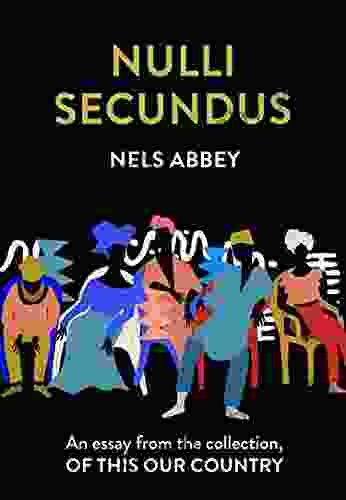
 Ernesto SabatoAn Essay from the Collection of This Our Country: A Journey of Discovery and...
Ernesto SabatoAn Essay from the Collection of This Our Country: A Journey of Discovery and...
 Gordon CoxJourney into the Raucous World of Straw: A Season of Brawling, Boozing, Bimbo...
Gordon CoxJourney into the Raucous World of Straw: A Season of Brawling, Boozing, Bimbo... Denzel HayesFollow ·2.6k
Denzel HayesFollow ·2.6k Albert ReedFollow ·4.7k
Albert ReedFollow ·4.7k Jordan BlairFollow ·18.2k
Jordan BlairFollow ·18.2k Rudyard KiplingFollow ·13.6k
Rudyard KiplingFollow ·13.6k E.E. CummingsFollow ·17.3k
E.E. CummingsFollow ·17.3k Jett PowellFollow ·16.8k
Jett PowellFollow ·16.8k Nathaniel PowellFollow ·10.6k
Nathaniel PowellFollow ·10.6k Curtis StewartFollow ·14.6k
Curtis StewartFollow ·14.6k
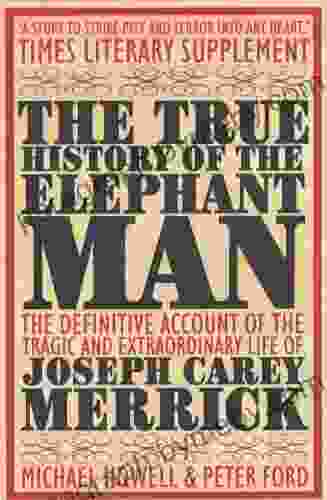
 Jeremy Mitchell
Jeremy MitchellUnveiling the Truth: The Captivating Saga of The Elephant...
Embark on a poignant journey through the...

 Marvin Hayes
Marvin HayesThe Day The World Came To Town: A Heartwarming Tale of a...
In the quaint...
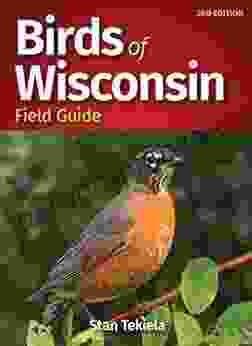
 Hugh Bell
Hugh BellExplore the Avian Treasures of Wisconsin: A Review of...
Unveiling the Secrets of...
5 out of 5
| Language | : | English |
| File size | : | 2012 KB |
| Text-to-Speech | : | Enabled |
| Screen Reader | : | Supported |
| Enhanced typesetting | : | Enabled |
| Word Wise | : | Enabled |
| Print length | : | 172 pages |
| Lending | : | Enabled |


